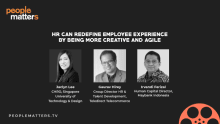The shift from 'War for Talent' to 'Renaissance of Talent'

Businesses and organizations have come a long way in the VUCA (Volatility, uncertainty, complexity and ambiguity) world and are evolving each day with changing dynamics. ‘Disruption’ is the name of the game with digitization ruling the roost in transforming business models and work cultures alike. The digital onslaught has brought about mammoth disruptions to business models, nature of work as well as workforce across organizations and industries which are poised to have a significant impact on the employment landscape in the coming years.
We are currently at the cusp of a fourth industrial revolution 4.0. The invasion of digital processes has been more pronounced than ever before in reshaping the business landscape. Many of the major drivers of transformation currently affecting global industries are expected to have a telling impact on jobs, ranging from significant job creation to job displacement, and from heightened labor productivity to widening skill gaps. While developments in previously disjointed fields such as artificial intelligence, machine learning and robotics are all amplifying one another like never before, smart systems have taken charge to help deal with a vast array of issues such as supply chain to employee management. In sync with this technological revolution are broader socioeconomic, geopolitical and demographic developments that are a result of the digital drive and their cumulative impact is only set to change the ballgame of talent management.
Renaissance Of Talent
Innumerable debates have sparked off the need and the necessity to not only discuss but find solutions to the debate on the “War for Talent” initiated by Mckinsey’s study in the year 1999. Talent Management can be succinctly defined as the management of those processes which pertain to the acquiring, developing and retaining people. However, Mckinsey’s golden principles to address the “War for Talent” still remain un-utilized at many levels and it continues to intrigue many organizations grappling with talent issues.
Today, we are at the juncture where there is an on-going shift from the “War for Talent” to “Talent Renaissance”. The analogy seems ironical, however, like the renaissance of medieval times, where it was not merely a revival of the learning of ancient times but also about - the spirit of inquiry, the spirit of freedom in thought and action, of questioning the teachings, customs, and processes while developing a critical attitude. The Renaissance of Talent redefines the resurging talent landscape, its interpretation and management. The changing nature of the workforce, the short-lived span of careers, rising aspirations to do something different, a splurge in the entrepreneurial spirit and the power of decision making and freedom of thought and action of newly evolving or rising talent are forcing companies to rethink the way companies compete for and leverage talent. The talent of the digital age is more inquisitive, entrepreneurial, empirical, effusive, enigmatic, ingenious and definitely more agile.
In the context of the digital world, Talent management is being redefined as the science of managing talent agility, talent environment and talent experience. The 3T framework supports the renaissance of talent and brings in a new focus in the way talent is acquired, developed and retained.
E1: Talent Agility
Talent acquisition or talent attraction is set to change to talent agility. The changing nature of the workforce includes Net Generations, Millennials, Talent Networks and Gig workers. The Net-Generation include children aged 13-30; they are the true first generation of the digital age. “Millennials” are a diverse generation that has a mindset that’s focussed on individuality, global connectedness and purpose. We have more of Talent Entrepreneurship with innumerable start-ups practically mushrooming each day.
In the wake of opportunities and threats darted by digital disruption, identifying talent with requisite skill sets is also at a crisis point. Work is increasingly becoming more virtual through an ‘anywhere and anytime’ environment empowered through mobile personal devices along with real-time communications. The new Gig economy is also changing work contracts. Boundary-less work partnerships and networks are redefining working relationships and capabilities. There is a growing reliance on freelancers to acquire skills for cross-functional self-managed teams, work is getting outsourced, companies are being bought for talent expertise and specialization is the name of the game. Intelligence quotient is now being replaced by social intelligence. We no longer have a choice but to rethink the way we have been thinking of talent and its attraction. These factors are causing companies to rethink recruiting, compensation, training, collaboration, retention and the management of talent.
E2: Talent Environment
Organizations are changing drastically with flat organizational structures replacing workplace hierarchies. With growing global connectivity and distant workplace networking, leveraging talent network is increasingly on the rise. Someone in Shanghai could be working closely with teams in Melbourne and New Jersey and is most comfortable in resolving issues using digital tools. Such is the fluidity of the newly emerging work culture and leveraging networks play a pivotal role in this new age of digital dominance.
These new approaches to managing talent require very different workplaces that can respond faster and in more collaborative ways to engage this range of talent relationships in order to build value. The new breed of workforce prefers to define their own roles. They also come with specialized skills and are entrepreneurial and are far more comfortable adapting to fluid work cultures and networking in an unknown environment. Transparency and flexibility are pillars to building a culture in a digital world. It’s a new way of thinking. Decision-making too is turning a new leaf. It is witnessing a paradigm shift from centralization to egalitarian decisions garnering unanimous consensus.
E3: Talent Experience
Talent Engagement is set to evolve into a new form of “Talent Experience” in the digital world and will reshape the way we think of talent engagement. The shift will continue to grow stronger towards helping companies improve the “employee experience” in today’s digital work environment. It is a motley mix of Millennials who are born into the digital world and come with a different mindset altogether. They think and breathe the digital space. They come with a whole new set of aspirations and believe in defining their own landscapes. Organizations need to restructure and reorganize themselves and become more agile. Change is the only constant and companies that keep up with the pace of changing patterns auger well amid the dynamic environment. Be it processes that are accessible and promote transparency or practices that enhance credibility along with ease of operation, companies galore are in a bid to champion agility. Organizations thus need to take a leap and start molding their thoughts in tandem with the new workforce and their expectations and the customized experiences they create.
Digitization and disruption are inevitable and integral to the evolving corporate landscape and Workplace transformation will continue at a break-neck speed. While the workforce is all set to gear up for the challenge of change, organizations and management systems need to keep abreast of the transforming trends to carve out a success story through digital diaries.
In a rapidly evolving employment landscape, the ability to anticipate the future of talent management is an imperative for organizations to be able to perform well and mitigate undesirable outcomes. The challenge for organizations and for CHROs will be to identify and align their talent strategies with the strategic priorities identified in their business strategy to create value for their organization.






